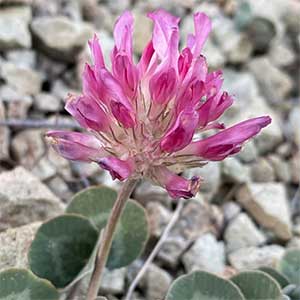|
Santa Cruz clover
|
Owyhee clover
|
| Herbs annual, 5–40 cm, glabrous. |
Herbs perennial, 10–20 cm, glaucous, glabrous. |
decumbent to ascending or erect, slightly branched. |
cespitose, spreading, branched proximally, sparsely branched distally. |
palmate; stipules whitish with prominent green veins, ovate, 0.3–0.5 cm, margins lacerate, apex acute to acuminate; petiole 1–2.4 cm; petiolules to 0.5 mm; leaflets 3, blades obovate to elliptic, 0.6–1.5 × 0.3–0.8 cm, base cuneate, veins ± thickened distally, margins denticulate, sometimes entire proximally, apex rounded, acute, or retuse, surfaces glabrous. |
palmate; stipules broadly obovate, 1–2 cm, fused at base, margins slightly lobed, apex acute; petiole 2–6 cm; petiolules 1–1.5 mm; leaflets 3, blades ovate, obovate, or orbiculate, slightly overlapping, 1–2 × 0.7–2.3 cm, base truncate to rounded, veins prominent, margins sparsely dentate, apex rounded, emarginate, surfaces glabrous. |
terminal or axillary, 15–20-flowered (early inflorescences hidden in stipules, subsessile, 2–5-flowered, flowers cleistogamous), subglobose, 0.5–0.8 × 0.6–0.8 cm; involucres flattened or shallowly bowl-shaped, 6–8 mm, when folded, nearly hiding calyces, glabrous or sparsely hairy, lobes 4 or 5, ± parallel-sided, 3 or 4-toothed. |
terminal, 20–30-flowered, globose, usually formed of 2 sessile heads, 2.5–5 × 2.5–5 cm; involucres absent. |
1–3.5 cm. |
3–7 cm, surpassing subtending leaves. |
straight, to 0.5 mm; bracteoles absent. |
erect, reflexed in proximalmost flowers, 1 mm; bracteoles cuplike, 0.5 mm. |
7–8 mm; calyx tubular, 4–5 mm, glabrous, veins 10, tube 2–2.5 mm, lobes subequal, triangular, margins conspicuously 2 or 3-toothed, apex aristate, orifice open; corolla pale pink or white, 6–7 mm, banner oblong, 5–7 × 1 mm, apex emarginate or erose. |
15–21 mm; calyx tubular-campanulate, 9–12 mm, pilose, veins 10, tube 4.5–6 mm, lobes subequal, abaxialmost longest, subulate, orifice open; corolla deep pink or magenta, 20–23 mm, banner tubular for most their length, 18–22 × 5–7 mm, apex flared. |
ovoid, 2.5 mm. |
ellipsoid, 4–5 mm. |
1, dark brown, slightly mottled, ovoid, 2 mm, smooth. |
1 or 2, yellow-mottled, mitten-shaped, 2–3 mm, smooth. |
|
|
|
|
| Flowering May–Jun. |
Flowering May–Jun. |
| Meadows, roadsides, grassy hillsides. |
Dry shale hillsides on diatomaceous earth. |
| 0–300 m. (0–1000 ft.) |
1000–2000 m. (3300–6600 ft.) |
|
CA |
ID; OR
|
Trifolium buckwestiorum, which ranges from Mendocino to Monterey counties, is unique among clovers in North America because of its aboveground cleistogamous, axillary flowers. The only other clover in North America that produces cleistogamous flowers is T. amphianthum, which produces its cleistogamous flowers at ground level and then pushes them into the substrate. (Discussion copyrighted by Flora of North America; reprinted with permission.) |
Trifolium owyheense is known from about 40 populations in a small portion of east-central Malheur County in Oregon, and immediately adjacent Owyhee County in Idaho (M. Mancuso 2001). (Discussion copyrighted by Flora of North America; reprinted with permission.) |
| FNA vol. 11. |
FNA vol. 11. |
| Fabaceae > subfam. Faboideae > Trifolium |
Fabaceae > subfam. Faboideae > Trifolium |
T. albopurpureum, T. alexandrinum, T. amoenum, T. amphianthum, T. andersonii, T. andinum, T. angustifolium, T. appendiculatum, T. arvense, T. attenuatum, T. aureum, T. barbigerum, T. barnebyi, T. beckwithii, T. bejariense, T. bifidum, T. bolanderi, T. brandegeei, T. breweri, T. calcaricum, T. campestre, T. carolinianum, T. cernuum, T. ciliolatum, T. columbinum, T. cyathiferum, T. dasyphyllum, T. dedeckerae, T. depauperatum, T. dichotomum, T. douglasii, T. dubium, T. echinatum, T. eriocephalum, T. fragiferum, T. friscanum, T. fucatum, T. glomeratum, T. gracilentum, T. grayi, T. gymnocarpon, T. haydenii, T. hirtum, T. howellii, T. hybridum, T. hydrophilum, T. incarnatum, T. jokerstii, T. kentuckiense, T. kingii, T. lappaceum, T. latifolium, T. leibergii, T. lemmonii, T. longipes, T. lupinaster, T. macilentum, T. macraei, T. macrocephalum, T. medium, T. microcephalum, T. microdon, T. monanthum, T. mucronatum, T. nanum, T. nigrescens, T. obtusiflorum, T. oliganthum, T. ornithopodioides, T. owyheense, T. palmeri, T. parryi, T. pinetorum, T. piorkowskii, T. plumosum, T. polyodon, T. pratense, T. productum, T. reflexum, T. repens, T. resupinatum, T. retusum, T. rollinsii, T. siskiyouense, T. sonorense, T. stoloniferum, T. striatum, T. subterraneum, T. suffocatum, T. thompsonii, T. tomentosum, T. trichocalyx, T. variegatum, T. vesiculosum, T. virginicum, T. willdenovii, T. wormskioldii |
T. albopurpureum, T. alexandrinum, T. amoenum, T. amphianthum, T. andersonii, T. andinum, T. angustifolium, T. appendiculatum, T. arvense, T. attenuatum, T. aureum, T. barbigerum, T. barnebyi, T. beckwithii, T. bejariense, T. bifidum, T. bolanderi, T. brandegeei, T. breweri, T. buckwestiorum, T. calcaricum, T. campestre, T. carolinianum, T. cernuum, T. ciliolatum, T. columbinum, T. cyathiferum, T. dasyphyllum, T. dedeckerae, T. depauperatum, T. dichotomum, T. douglasii, T. dubium, T. echinatum, T. eriocephalum, T. fragiferum, T. friscanum, T. fucatum, T. glomeratum, T. gracilentum, T. grayi, T. gymnocarpon, T. haydenii, T. hirtum, T. howellii, T. hybridum, T. hydrophilum, T. incarnatum, T. jokerstii, T. kentuckiense, T. kingii, T. lappaceum, T. latifolium, T. leibergii, T. lemmonii, T. longipes, T. lupinaster, T. macilentum, T. macraei, T. macrocephalum, T. medium, T. microcephalum, T. microdon, T. monanthum, T. mucronatum, T. nanum, T. nigrescens, T. obtusiflorum, T. oliganthum, T. ornithopodioides, T. palmeri, T. parryi, T. pinetorum, T. piorkowskii, T. plumosum, T. polyodon, T. pratense, T. productum, T. reflexum, T. repens, T. resupinatum, T. retusum, T. rollinsii, T. siskiyouense, T. sonorense, T. stoloniferum, T. striatum, T. subterraneum, T. suffocatum, T. thompsonii, T. tomentosum, T. trichocalyx, T. variegatum, T. vesiculosum, T. virginicum, T. willdenovii, T. wormskioldii |
| Isely: Madroño 39: 90, fig. 2. (1992) |
Gilkey: Madroño 13: 169, fig. 1. (1956) |
| |
